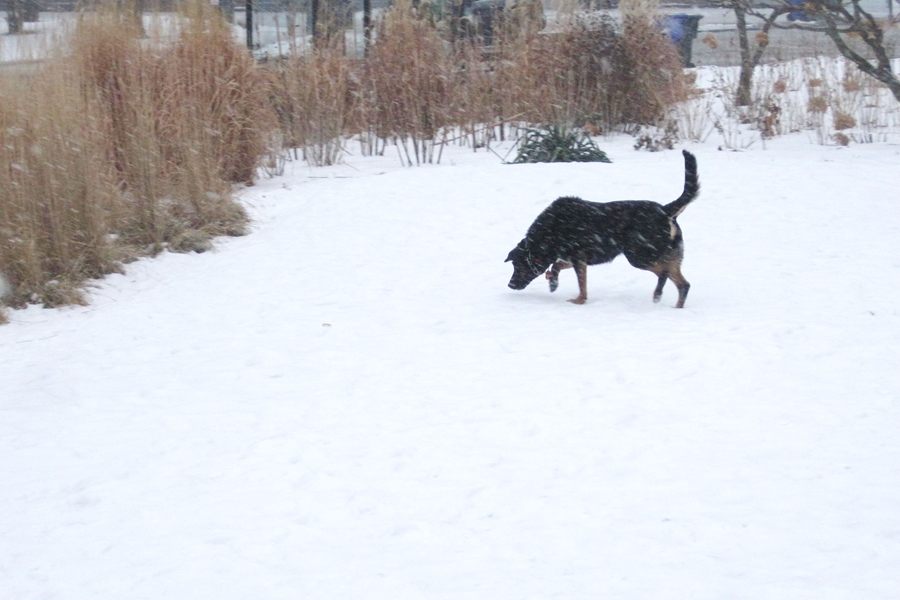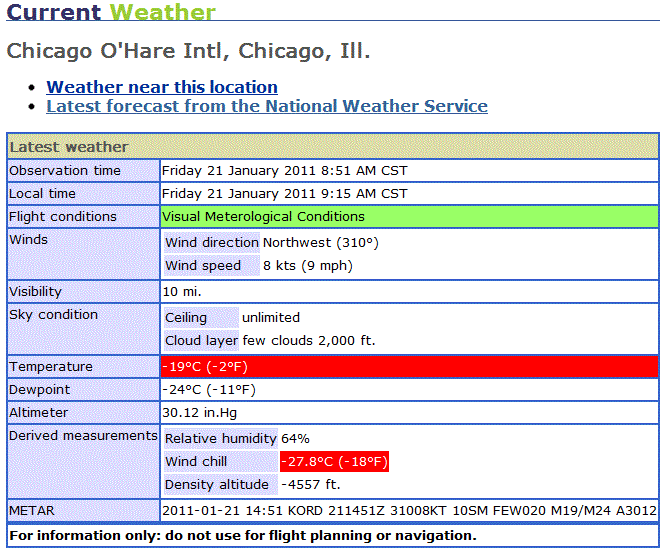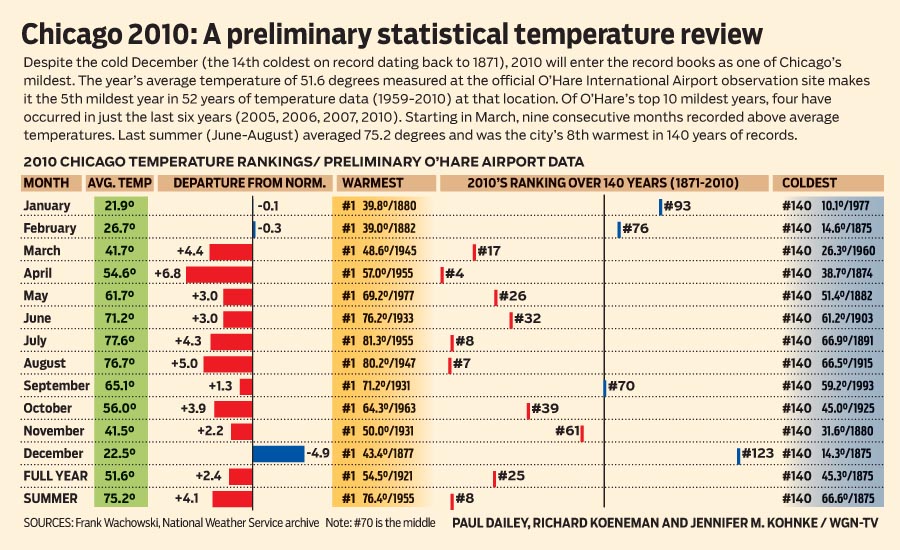We're likely to begin February with the biggest snowfall in Chicago's recorded history:
A Blizzard Watch is in effect Tuesday afternoon through Wednesday as a strengthening low pressure system moves up the Ohio Valley. Late Tuesday afternoon steady snow and stronger winds will push into the region, starting south of I-80 and spreading north during the evening.
Snowfall rates Tuesday night could approach 50 to 80 mm per hour and when combined with sustained winds at 50-60 km/h, visibilities are will drop significantly with near whiteout conditions possible.
Snow totals of 30 to 50 cm are possible between Monday night and Wednesday afternoon with locally higher amounts. Drifting and blowing snow will make travel dangerous and possibly life threatening Tuesday night.
Lakeshore flooding is also a possibility. Waves of 3 to 5 m will crash along the Illinois side of the Lake Michigan shoreline.
Oh. Joy.
This winter Chicago has had below-average temperatures overall but nothing really cold. It's like a study in moderation, only unusual when you see the numbers rather than when you experience it:
Just one day this season has produced a sub-minus-17 Celsius low temperature and only one day has failed to climb out of single digits. Since the start of the three month (December through February) meteorological winter period, 38 of the 59 days—64% of them—have generated below normal readings.
It's a fact that except for New Year's Day, not a single day has produced a high over 4°C. And, the month of January has hosted only three days with highs above freezing—a fraction of the 141-year average of 14 above-freezing days to date. That's the fewest above-freezing days to occur in a January here in the 34 years since 1977.
Temperatures Saturday may poke above freezing long enough to turn the snow which has covered the ground here for 19 consecutive days a bit slushy. But a thaw capable of melting snow currently on the ground isn't in sight as we approach February 2011's arrival Tuesday, nor is a thaw expected in the week which follows.
The official temperature right now is 1°C, the warmest we expect it to be for at least the next week.
New York City has had its 6th and 8th biggest snowstorms of all time this winter, and it's a week away from another one:
Here is the complete list of the top-ten biggest snows there from Dr. Jeff Masters' Wunderblog:
1) 26.9" Feb 11-12, 2006
2) 26.4" Dec 26-27, 1947
3) 21.0" Mar 12-14, 1888
4) 20.8" Feb 25-26, 2010
5) 20.2" Jan 7-8, 1996
6) 20.0" Dec 26-27, 2010
7) 19.8" Feb 16-17, 2003
8) 19.0" Jan 26-27, 2011
9) 18.1" Mar 7-8, 1941
10) 17.7" Feb 5-7, 1978
I remember the one in February 2003: it stranded me in Washington for two days. At the Hyatt. Which, you know, really wasn't horrible, all things considering.
I digress.
The Canadian weather bureau forecasts another winter storm to dip around the Great Lakes and hit Chicago on Tuesday; however, all the other models in the world project the storm slinking much farther East and hitting Atlanta, Raleigh, DC, New York, and Boston.
By the way, one of the major predictions of anthropomorphic climate change theory is that the North American storm track will shift south. It used to go pretty much straight across Illinois during the winter and across Wisconsin in the summer. Now we're seeing the track generally around Nashville in the winter and St. Louis in the summer. That means, a warmer climate overall will cause more precipitation in the Southeast and Northeast during the winter, and more in the Central Plains during the summer. It also means generally milder weather around the Great Lakes.
One dog + snow – leash = one happy dog:

The last couple of days have reminded us we live in Chicago, severely limiting Parker's walk time. I don't want to keep him outside more than 15 minutes when it's below -15°C. He doesn't understand hypothermia, and he's got a double coat, so to him it seems like I'm being completely arbitrary. He probably doesn't remember the day it got down to -27°C and he fell over, whimpering, because his paws were too cold to walk after less than five minutes outside.
So he's at day camp today, and I'm working on an interesting coding problem.
I hope he comes home really, really tired.
At least the sun is out:

We had days last year close to -17°C, but it was last this cold on 5 February 2009. Parker is bored, but even he didn't seem to want to stay outside this morning.
As an aside, because of the radiator in my living room the Inner Drive Technology Worldwide Data Center that I can't turn off, I have two windows open right now and it's still 24°C—3°C above normal—over by the server rack.
Should they go to year-round Daylight Saving Time? Scotland says no:
Britain currently sets its clocks at Greenwich Mean Time in fall and an hour ahead of that in spring. (New York is generally five hours behind Britain; Western Europe is an hour ahead).
The problem is that while a clock change might bring afternoon joy to London, it would condemn Inverness in the far reaches of Scotland — in relative terms, about 700 miles north of Montreal — to long, dark winter mornings with sunrises as late as 10 a.m.
Even worse, many Scots feel, it would mean giving in to English politicians. Though the devolution of British politics has given Scotland its own legislature and responsibility for many of its own affairs, the clock is still controlled by Parliament in London.
(You can see what sunrises and sunsets would look like up there at Weather Now.)
Daylight Saving Time has generated controversy for almost a century now, with good and bad arguments on both sides. I'm almost indifferent, though I do get annoyed waking up in the dark at the beginning of November.
Forecasters predict Chicago will get down to its coldest temperature so far this winter, -19°C, overnight:
What arrives Thursday night and Friday morning on gusty northwest winds is but a lobe of cold air off that vast wintry reservoir of air. If there's one piece of good news which accompanies the cold blast, it's that the chill is to hit hard for a day and a half then back off, giving way to a more moderate brand of cold air this weekend. But, while its stay here is to be comparatively brief, the near -18°C low temperature predicted at O'Hare is to be accompanied by 24-32 km/h sustained winds likely to generate dangerous wind chills under 20-below---and potentially as low as 30-below in a few of colder locations north and northwest of the city.
But on this day in 1985 we experienced -33°C, the coldest temperature recorded in Chicago. If I recall correctly that was one of only two days in my four years of high school when they closed the school for weather—because they couldn't start the buses.
At least the snowstorm pounding the central U.S. will miss us.
This time of year Chicago residents can easily forget the planet orbits an actual star that gives off actual heat and light. This month hasn't helped a bit:
If you're susceptible to SAD---Season Affective Disorder---a form of depression brought on by winter's short days and lack of sunlight, the past 9 days (since Tuesday, January 11) have no doubt been especially rough. The period has logged only 10 percent of its possible sunshine, we're told by veteran National Weather Service observer Frank Wachowski---a total of just 7.9 hours.
Under the best circumstances, a typical January is not one of Chicago's sunnier months. But this month's abysmal 10 percent tally falls far short January's average of 43 percent of its possible sun. That means Chicago area residents have seen less than a quarter of January's typical sunshine.
But good news! We'll have a couple of sunny days later this week. Yes, once that cold front passes and that pile of cold, dry air pushes on through, we'll have plenty of sun—and -16°C temperatures.
Sigh.
Update, 13:56 CT: Look! Up in the sky! It's...it's...the sun!
It turns out, December was a lot colder (relatively) than the rest of 2010:

So after nine months of above-average temperatures, including three in the top-10 warmest in recorded history, we got December, in the top decile of coldest months. I'm happy about the last two days when we had a brief, spring-like spell of 10°C temperatures, but wow, what a tease.